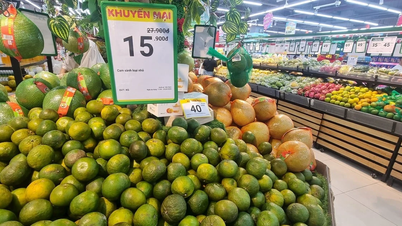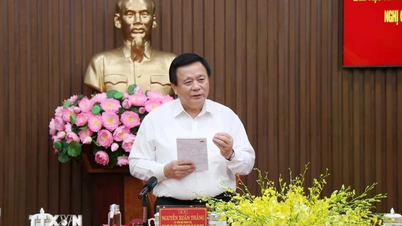No bank transfer, COD orders accepted
According to Decree 70, from June 1, individuals and business households that are paying lump-sum tax and have a revenue of 1 billion VND/year or more must apply electronic invoices generated from cash registers connected to tax authorities. Revenue will be calculated correctly, fully, and closer to reality, accordingly, the lump-sum tax rate may be adjusted.
Applying the provisions of Circular 40/2021, individuals and business households with annual revenue of 100 million VND or more are required to pay 3 types of taxes and fees including: Business license fee, value added tax (VAT) and personal income tax.
With the application of electronic invoice and document management, many businesses have started to calculate VAT on customer invoices. Accordingly, the price of goods to consumers is higher.
The announcement from the Facebook account selling processed foods at 945 Hong Ha ( Hanoi ) clearly stated that the prices of all items will increase from June 1. According to this unit, this is the only way to implement the new tax law.
"The store does not have to worry or evade payment, but pays more taxes on behalf of customers, contributing to the country's development. Customers still transfer money normally, and companies and agencies will have valid invoices as payment documents," the store said, but also expressed concern that customers will have to pay high prices and goods will sell slowly.
Ms. Thuy Ha (Dong Da, Hanoi) said she was quite surprised when recently, when going to traditional markets, many sellers reminded her "bring cash next time". "I often buy beef at a familiar stall in Kim Lien market (Hanoi), the seller said that they would not allow money transfers anymore because the money going into the account is monitored", Ms. Ha said.
While direct stores do not accept bank transfers, online sellers have also changed the way they receive money. Sellers change their accounts to receive money and do not accept COD orders. "We no longer support COD collection. Any order that customers are afraid of risks and want COD will have to pay an additional 8% VAT and 1.5% personal income tax," Ms. Vu T., an online seller in Hanoi, announced.
Sellers also constantly urge customers to transfer money to send goods early, to avoid market management from searching and checking the origin.
Can I avoid paying taxes by not accepting transfers?
Mr. Le Van Tuan - Director of Keytas Tax Accounting Company Limited - said that "avoiding" money transfers and receiving cash by business households is a misunderstanding of tax obligations.
"Whether receiving cash or transferring money, dividing money into different receiving accounts, changing the content of receiving money, or doing anything else, the tax obligations of business individuals still occur. Tax obligations are based on the nature of business activities, only when the revenue is less than 100 million VND/year (the following year is less than 200 million VND/year) do you not have to pay tax," Mr. Tuan explained and affirmed that, regardless of business registration or not, if there are sales and service activities, the tax obligations of business households must be fulfilled.
Some restaurants, eateries... announced that they only accept cash, not transfers, we hope you understand. Mr. Tuan assessed that it is very difficult for businesses like the above to operate in the long term, and tax authorities will easily pay attention to these cases.
"When this behavior occurs, the tax authority will collect additional tax and it is easy to prosecute because this is intentional tax evasion, not accidental," Mr. Tuan is concerned.

Notice of stopping receiving money transfers that many consumers have reported on forums.
Online sellers ask customers to transfer money to many different accounts, without recording the transfer content... with the thought that if it is not related to the purchase and sale of goods or services, no one will know, taxes can be reduced, or only tax obligations are fulfilled on the content related to the purchase and sale of goods.
However, Mr. Tuan said that this is a mistake for taxpayers, because the total revenue will be calculated on the total of all accounts of that individual. "The taxpayer's information has been identified on VneID, linked on the bank account and eTax Mobile application. This data may be confidential to individuals, but for the authorities, there is complete information and evidence to consider the taxpayer's tax obligations. The total revenue is still there, regardless of what the transfer content is written on," Mr. Tuan pointed out.
Tax authorities and competent authorities have professional measures to verify whether it is the taxpayer's revenue or not. If the taxpayer cannot explain clearly, the authorities have grounds to suspect tax evasion.
"Not registering a business, receiving cash, dividing money into different accounts, recording money transfer contents unrelated to the purchase and sale of goods and services... are acts of intentional tax evasion. Individuals and business households need to determine long-term goals, proactively learn about tax laws and fully fulfill tax obligations, to avoid facing legal risks in the future," Mr. Tuan emphasized.
Mr. Mai Son - Deputy Director of the Tax Department, Ministry of Finance - said that the tax sector can compare the declared revenue of business households with payment cash flow, electronic invoice data, or information from banks, market management agencies; promptly identify households with signs of tax evasion... On the contrary, business households with good compliance will be supported by tax authorities, creating maximum favorable conditions for effective operation.
According to data from the General Statistics Office, Ministry of Finance, by the end of 2024, the country had 3.6 million business households under tax management, contributing more than VND 25,950 billion to the state budget. Of these, nearly 2 million households paid lump-sum tax, meaning that the tax authority sets a fixed revenue level for the whole year and the business households paid taxes based on this lump-sum level. However, the average monthly tax rate of nearly 2 million business households under the lump-sum form in the first quarter was only about VND 700,000/month/household.
(According to TPO)
Source: https://baoyenbai.com.vn/12/351252/Tu-choi-nhan-chuyen-khoan-lan-rong-chuyen-gi-dang-xay-ra.aspx




























































































![[OCOP REVIEW] Tu Duyen Syrup - The essence of herbs from the mountains and forests of Nhu Thanh](https://vphoto.vietnam.vn/thumb/402x226/vietnam/resource/IMAGE/2025/6/5/58ca32fce4ec44039e444fbfae7e75ec)






Comment (0)